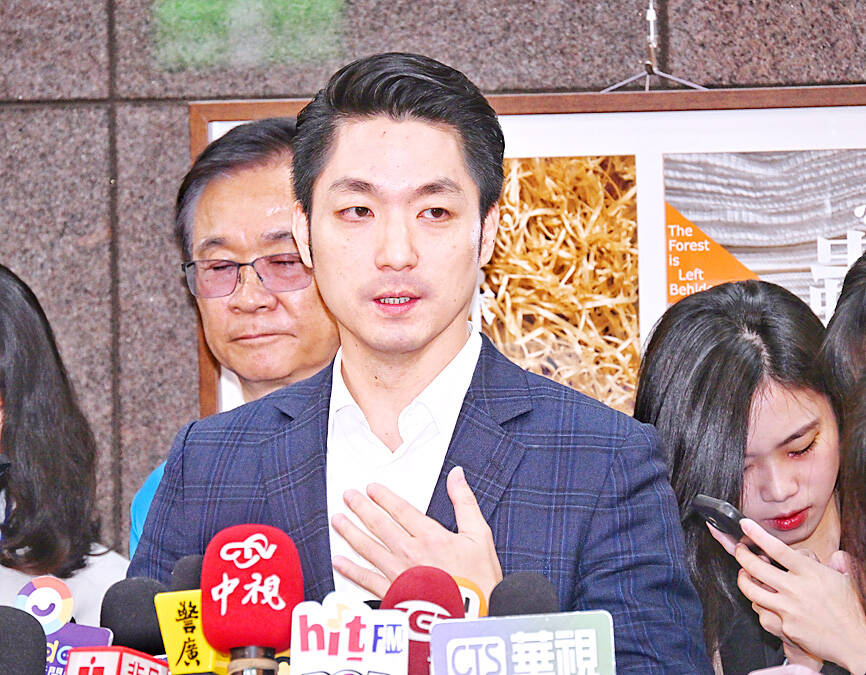Taipei is to end a controversial police surveillance camera transmission service contract with a company being investigated for alleged bribery, Taipei Mayor Chiang Wan-an (蔣萬安) said yesterday.
On Thursday last week, Chinese Nationalist Party (KMT) Taipei City Councilor Chen Chung-wen (陳重文) was detained and held incommunicado on suspicion of corruption.
Chen allegedly accepted kickbacks from Taiwan Intelligent Fiber Optic Network Consortium (Taifo) to pressure the Taipei City Police Department to increase its budget for the company’s fiber optic network for closed-circuit television (CCTV) cameras.

Photo: Fang Pin-chao, Taipei Times
The Taipei City Government in 2011, when Hau Lung-bin (郝龍斌) of the KMT was mayor, signed a 25-year contract with Taifo to build a fiber optic network in the city.
In 2017 — under then-mayor Ko Wen-je (柯文哲), now chairman of the Taiwan People’s Party (TPP) — the city signed a subcontract with the company regarding transmission service fees for the city police's network of CCTV cameras.
Since Chen’s detention, Ko has repeatedly accused Chiang of conforming to the city council’s unreasonable budget for Taifo's services, while Chiang’s administration said the budget it proposed was based on the service rate signed in 2017.
In a news conference at Taipei City Hall to promote the Capital Cup WorldSkills Competition, Chiang said he does not know how Ko’s administration negotiated the monthly service fee of NT$2,200 (US$69) for 2M bandwidth per CCTV camera, as the mayor’s office only found meeting minutes documenting the approval of that rate.
Given the controversy over the agreement, he has asked the Taipei Department of Legal Affairs to immediately terminate the contract, he said.
Asked if the city government would investigate and cancel the main 2011 contract, Chiang said that only the 2017 agreement was being terminated at this time.
TPP Legislator Vivian Huang (黃珊珊), who was Taipei deputy mayor in Ko’s administration, said that the budget for the service was NT$460 million in Ko’s last year in office, but that Chiang’s administration proposed a budget of NT$550 million to upgrade to 3M bandwidth for all cameras.
As the 25-year contract could not be terminated, the Ko administration decided against paying a higher fee for increased bandwidth, she said, adding that canceling the main contract could create a gap that could risk information security.
Democratic Progressive Party Policy Research and Coordinating Committee director Wang Yi-chuan (王義川) said that as the contract is worth up to NT$10 billion, the KMT and the TPP should clarify how much of the taxpayers’ money has benefited Taifo.
If Ko keeps claiming that the main contract was unreasonable and that the city council was working in collusion with Taifo, then why did he allow the city to continue signing subcontracts with the company in his eight years in office? Wang asked.

Taiwanese can file complaints with the Tourism Administration to report travel agencies if their activities caused termination of a person’s citizenship, Mainland Affairs Council Minister Chiu Chui-cheng (邱垂正) said yesterday, after a podcaster highlighted a case in which a person’s citizenship was canceled for receiving a single-use Chinese passport to enter Russia. The council is aware of incidents in which people who signed up through Chinese travel agencies for tours of Russia were told they could obtain Russian visas and fast-track border clearance, Chiu told reporters on the sidelines of an event in Taipei. However, the travel agencies actually applied

Japanese footwear brand Onitsuka Tiger today issued a public apology and said it has suspended an employee amid allegations that the staff member discriminated against a Vietnamese customer at its Taipei 101 store. Posting on the social media platform Threads yesterday, a user said that an employee at the store said that “those shoes are very expensive” when her friend, who is a migrant worker from Vietnam, asked for assistance. The employee then ignored her until she asked again, to which she replied: "We don't have a size 37." The post had amassed nearly 26,000 likes and 916 comments as of this

New measures aimed at making Taiwan more attractive to foreign professionals came into effect this month, the National Development Council said yesterday. Among the changes, international students at Taiwanese universities would be able to work in Taiwan without a work permit in the two years after they graduate, explainer materials provided by the council said. In addition, foreign nationals who graduated from one of the world’s top 200 universities within the past five years can also apply for a two-year open work permit. Previously, those graduates would have needed to apply for a work permit using point-based criteria or have a Taiwanese company

The Shilin District Prosecutors’ Office yesterday indicted two Taiwanese and issued a wanted notice for Pete Liu (劉作虎), founder of Shenzhen-based smartphone manufacturer OnePlus Technology Co (萬普拉斯科技), for allegedly contravening the Act Governing Relations Between the People of the Taiwan Area and the Mainland Area (臺灣地區與大陸地區人民關係條例) by poaching 70 engineers in Taiwan. Liu allegedly traveled to Taiwan at the end of 2014 and met with a Taiwanese man surnamed Lin (林) to discuss establishing a mobile software research and development (R&D) team in Taiwan, prosecutors said. Without approval from the government, Lin, following Liu’s instructions, recruited more than 70 software